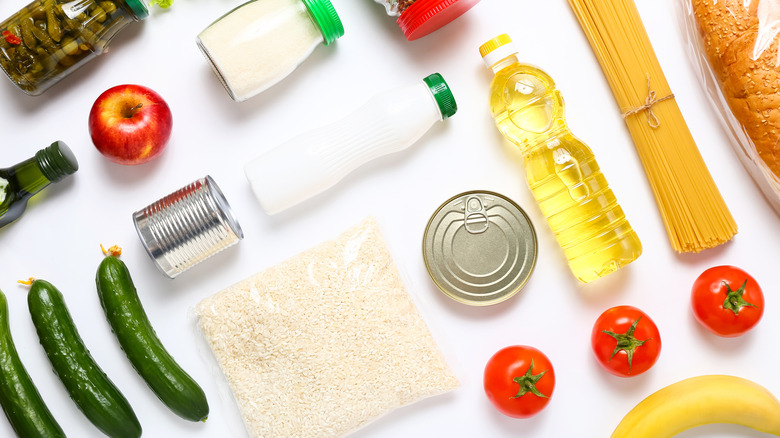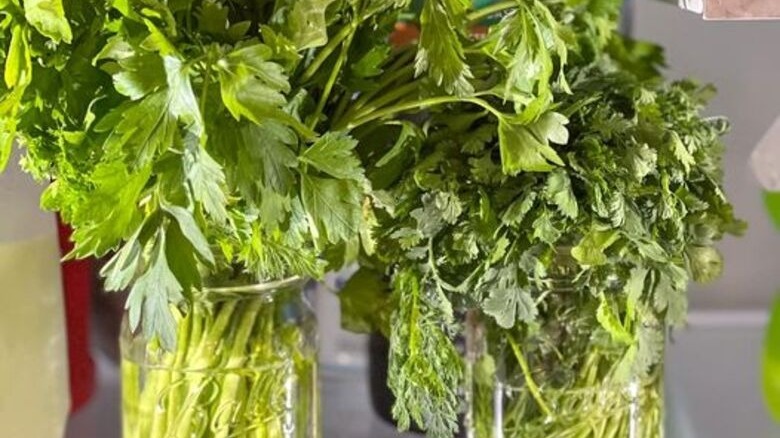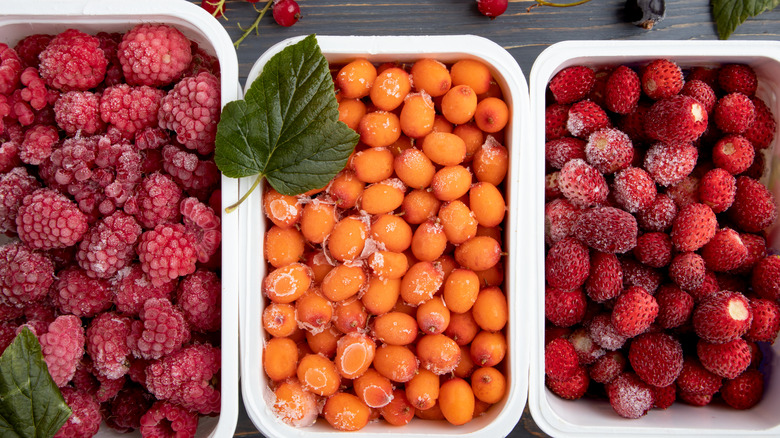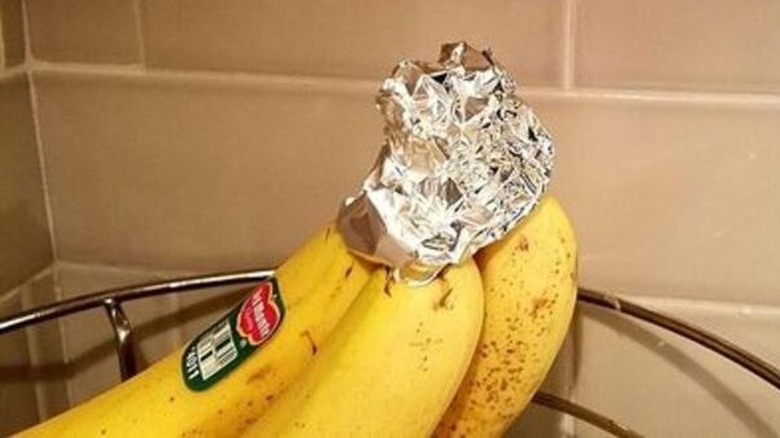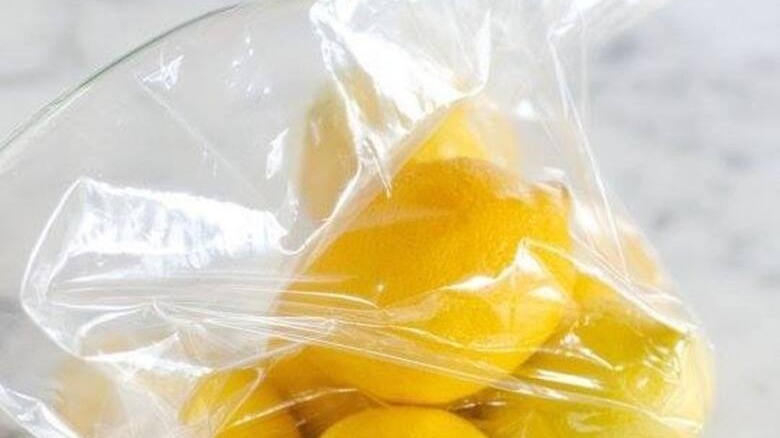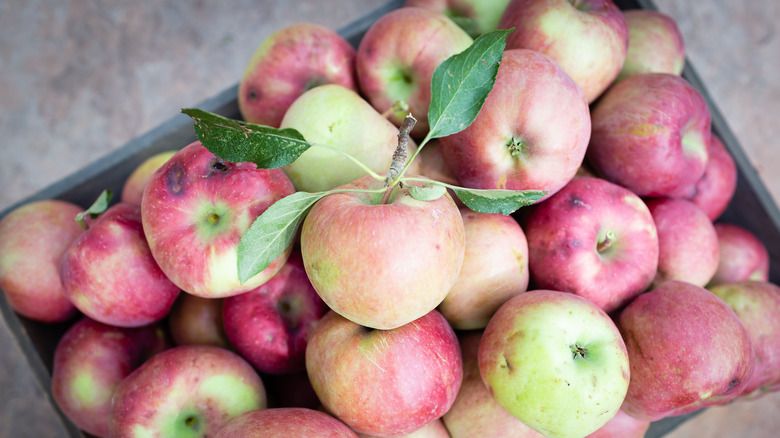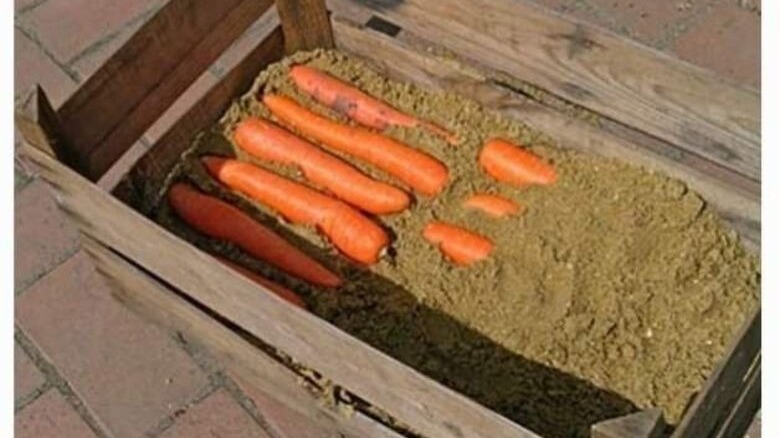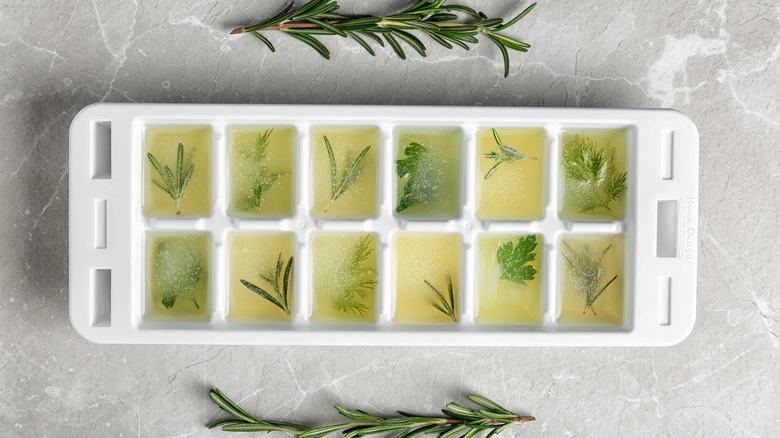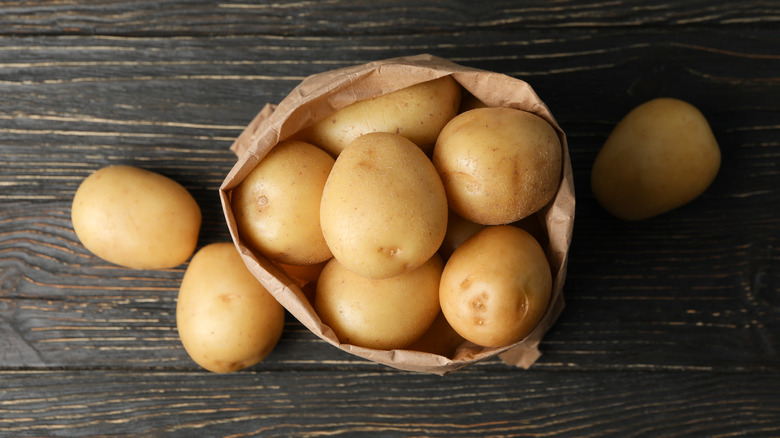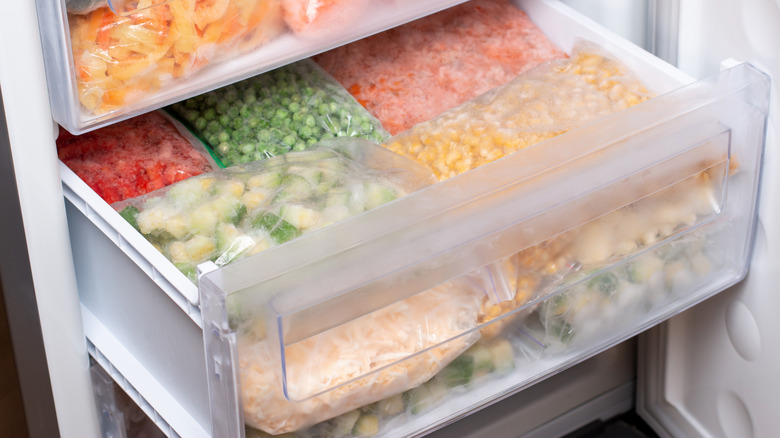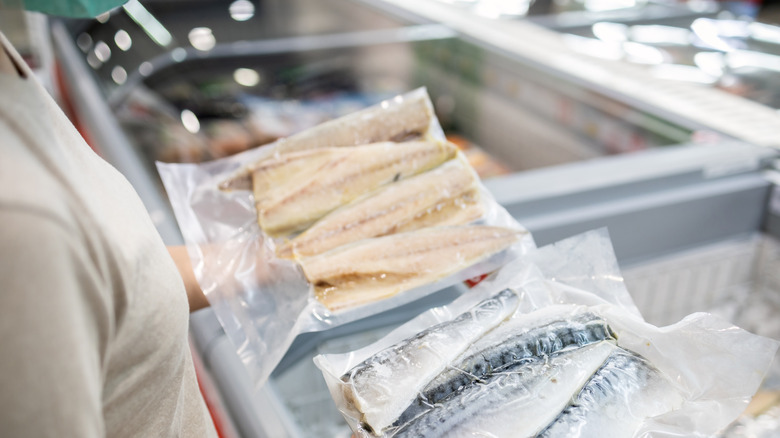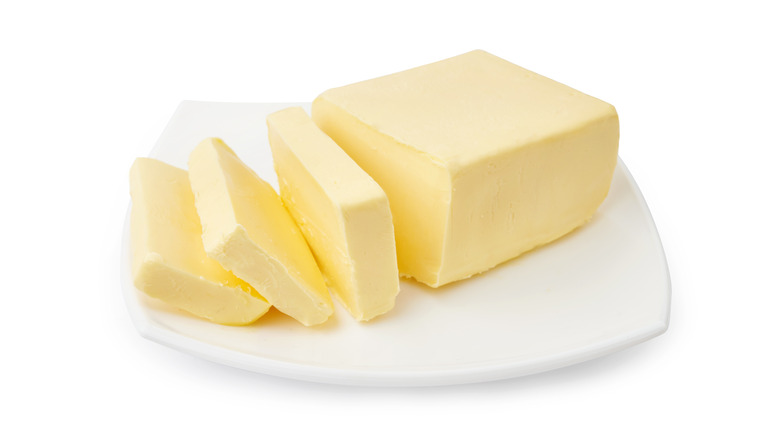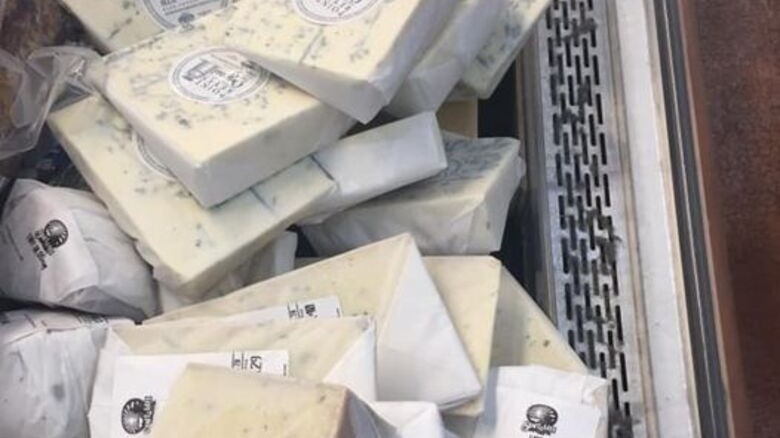14 Food Storage Hacks You Should Try
Nothing hurts more than throwing away an unopened box of strawberries. After all the effort you went through — going to the grocery store, picking out the best produce, and waiting in long lines to pay for them — having to pitch them is not easy. Not to mention, it's a huge waste of your money. What if we were to tell you that all that waste could be avoided with a few simple food storage hacks?
No more will you have to go through the pain of tossing away an unopened bag of wilted lettuce or a half-used jar of tomato paste. From storing your herbs to keep them fresh for longer to keeping your onions in pantyhose (yup, no kidding), we've compiled a few genius food storage hacks that will help you save big bucks and avoid unnecessary food waste. Spoiler alert: There'll be a lot of "why didn't I think of this sooner" moments!
Store herbs in a glass of water in the fridge
Despite our best efforts, herbs always seem to end up withering away. If only there was a magical incantation to keep them fresh in the fridge. But what if we told you there's a much simpler way to store herbs, and not only will they last longer, but they will retain their freshness and flavor?
To start, bring out your variety of herbs and sort them, as we'll be storing them accordingly. Plants like cilantro and mint leaves have soft stems and are grouped under tender herbs. Oregano, thyme, and the like all have hard stalks, so they are part of hard herbs (via The Pioneer Woman).
It's always best to store clean produce after removing dirt and bacteria. According to USA Today, you should trim the stems of herbs about an inch, and then place them in a cup of water and cover them with cling wrap or a resealable plastic bag. When that's done, place them in the fridge for long-lasting freshness. For hard-stem herbs, you should wrap them in a damp towel, place them in a resealable bag, and store them in the fridge.
Wash berries in vinegar and freeze in sealed containers
You've probably watched videos where they use a microscope to zoom in on fruits, where tiny creatures are just hanging out. We certainly don't want to be biting into them. Well, berries are one of those fruits you eat with the skin on, so you need a better way to wash them than just plain old water.
According to Best Food Facts, vinegar seems to do the trick in eradicating these bacteria. However, make sure to pick up the commercial variety rather than store-bought vinegar. Commercial vinegar has a higher concentration of acid that works well in cleaning fresh produce. What's more, you'll find those dirty, waxy layers to be completely gone after a thorough rinse with a commercial vinegar bottle.
First, make a vinegar solution using a 3:1 ratio with water and then give your berries a 10-minute soak. While washing berries under running water will also suffice, we like to be extra careful about cleaning our fruits. After you're done, you can store the berries in an airtight or sealed container.
Wrap your banana stems with plastic wrap or foil
If you're letting bananas turn brown to make some delicious banana bread, that's another story — but if not, browning bananas can be a nuisance. You've probably heard that bananas spoil other fruits as well if they're kept together, as they release a chemical called ethylene, per BBC.
But what to do with bananas that spoil at the speed of light? Okay, maybe not that quick, but they tend to start softening the moment you get them in your car from the grocery store to take home. How can you prevent your bananas from spoiling and attracting a bunch of fruit flies? We have an easy hack to try.
According to Lifehacker, you should wrap the banana stem or the big lump where all the other bananas are connected in plastic wrap or tin foil. This slows down the rotting process, otherwise known as "enzymatic browning." This process typically starts at the crown, where this chemical is released in abundance.
A YouTube video by Ideas Number One illustrates the hack perfectly. Simply cut a piece of aluminum foil or plastic wrap, wrap it around the stem, and press it tightly with your fingers. You'll see a stark difference in decay between a wrapped banana and an unwrapped one.
Rinse, dry, and store lemons in airtight bags in the fridge
Like everyone else, you have probably been storing lemons on the countertop, tossing them in a basket without a second thought. But have you ever stopped to wonder if this is the right way to store them, or if they run the risk of molding too quickly, especially in hot weather?
What if we were to tell you there's a better way that makes them last longer and retains their freshness? This new method is truly easy-peasy lemon squeezy.
In three simple steps, you'll have a fresh batch of lemons every time you need them. You only need to rinse them, pat them dry with a towel, and store them in an airtight bag or container — then stow them away in the fridge to keep them fresh.
According to Well+Good, the fridge's cold temperature helps slow the ripening of lemons, fruits, and other fresh produce. It also helps if they are kept away from ethylene-producing fruits like bananas, so the ripening process is slower. Once they're wrapped in a resealable bag, put the lemons in the crisper drawer with an air circulation system and temperature control.
Store your onions in pantyhose
Since onions are a staple for many dishes, we usually end up buying in bulk. While they often make us cry, we can't exact revenge on them by leaving them to spoil, so storing them somewhere they can breathe easily is a must. (On a side note, the Times Colonist notes that onions need to be kept away from the potatoes. Otherwise, both vegetables will spoil.)
In the pursuit of the perfect answer, we came across a truly breezy solution (pun intended). What better way to use old stockings or pantyhose than to store onions? These delicate things rip so easily that they might as well be put to better use before going into the trash can.
According to a blog from Brooklyn Farm Girl, you need to place only one onion (or a small cluster) inside the toe of the pantyhose, tie a knot, and then repeat the process until you run out of either space or onions. Then you can simply hang them on a hook in the pantry. We find that this hack not only keeps the onions fresh for longer, but also saves space. And, of course, it makes good use of old pantyhose.
Freeze leftover tomato paste in resealable bags
Leftover tomato paste can be a nuisance to store. Especially if you're freezing it, when you'll be left stabbing it trying to get a chunk out so you can use it. With a simple trick and a tip, you'll be able to effectively store tomato paste without a struggle, cutting down on waste.
TikTok has a fantastic hack for this problem: Get out your resealable bags and pour the tomato paste into them. The smaller the bags, the better. This means you'll need more bags to store your tomato paste, but it will be worth it. Once you're done pouring, seal the bags tightly so the paste doesn't escape.
Next, take out a knife and flip it. With its back, press down firmly on the bag horizontally and then vertically until you get a plus sign. Once you're done marking the impression on it, take the bag and freeze it. When you're ready to use it, you can easily break the portions into clean pieces by pressing down on the bag with your hands and taking out whatever amount of tomato paste you need without a hassle.
Never store bruised apples with the good ones
Apples tend to rot quickly, especially if not properly stored. While bruises on apples are fairly common, did you know that storing the bruised apples with a batch of otherwise good apples is a bad thing?
You've probably heard the saying, "One bad apple spoils the bunch." This is true because apples, like bananas, are ethylene-producing fruits, which means keeping them with other fruit is a big fat "no." Per Livestrong, you shouldn't keep fruits like apples, bananas, kiwi, and mangos together, even with vegetables. Ethylene will cause premature ripening, leading to spoilage and mold.
McIntosh apples, for instance, are one of those that ripen at a faster rate due to higher ethylene concentration. To prevent this, you can keep the bruised apples separate from the good ones (via the University of Maine).
Per Gardeners World Magazine, you can store apples in a clear plastic bag to be kept in the fridge. Or you can even wrap individual apples in newspaper to store them for the winter. Here's a really cool DIY: You can use an old filing tray as an apple rack, a cheap yet clever substitute for an apple rack.
Store your carrots in sand or sawdust
Carrots are a staple food enjoyed at every meal, whether served raw, in salads, or as a roasted vegetable dish. Most people like to preserve this vegetable to be used year-round, especially during winters when the climate is too harsh for it to grow.
A couple of hacks have been discovered to store carrots during such weather. When the season calls for them to be uprooted, ensure that carrots are pulled out without mud or they must be cleaned and dried off before being stored. Let them bathe in sunlight for two days to harden them, and then remove the heads to prevent regrowth (via Original Homesteading).
Carrots can be stored in either damp sand from the river or sawdust. These both ensure that the carrots will retain the moisture necessary to keep them fresh and preserved for a long time. As far as where to store them, plastic tubs or wooden crates are ideal. Start with a layer of the sand or shavings, then add a row of carrots, then add another layer of the sand or sawdust before adding more carrots. This will keep the carrots separated so they don't touch each other.
Preserve fresh herbs in oil
In warmer temperatures, it's important to store and preserve your fresh produce, since heat is literally a vegetable's worst enemy. And out of all the vegetables, herbs are in particular need of saving. Well, there are always dried herbs, but the dried version (no offense) has nothing on fresh herbs; the freshness and flavor are unmatched.
The key to preserving herbs is freezing them in olive oil. The flavor of the herb-infused olive oil will instantly elevate your dishes. You can use the herbs to cook soups, stews, curries, or any other food.
According to The Pioneer Woman, all you need are some ice cube trays, extra virgin olive oil, and the herbs of your choice. You can use fresh oregano, thyme, rosemary, and more. Separate the herbs from their stalks and chop up the bigger pieces. Top up your ice cube tray halfway full, and then drizzle in the olive oil until the herbs are fully submerged. Next, cover with plastic film and freeze for up to eight hours. Remove your frozen cubes from the tray and transfer them to an airtight container. Now your herbs are ready to be stored for the long term.
Cover potatoes in brown paper and store in a dark place
Most everyone loves potatoes. From frying and boiling to baking and roasting, there are virtually countless ways to eat them.
According to Healthline, we can use a few simple tips to prolong potatoes' life. Once you've bought them, the first thing to do is let them sit in an airy bowl and out of the packaging to help them breathe.
Storing potatoes at a temperature ranging from 42-50 degrees Fahrenheit is ideal for keeping them fresh and ready to use anytime. The best places to store them are those that receive less sunlight, like basements, garages, and other underground areas.
Solanine is a harmful chemical found in potatoes, which is produced in large quantities if exposed to any kind of illuminating light or even sunlight (via Food Control). If digested, it causes health problems such as upset stomach, nausea, and a bad aftertaste, per Michigan State University.
As Healthline recommended, wash potatoes only if you're using them right away. Rinsing or washing away the dirt beforehand can promote the growth of fungus and bacteria from the introduction of moisture, so it's best to let them be when not in use.
Freeze seasonal produce to make it last longer
Out-of-season crops have a bland taste, and some folks simply dislike store-bought vegetables and fruit. In this case, you can simply buy extra seasonal produce and freeze it to use later.
Vegetables with high water or moisture content tend to become waterlogged, according to The Washington Post. Veggies like kale, peas, beans, broccoli, and corn are perfect ingredients to be frozen and stored. They thaw well, making it easy to instantly add them to your pasta and sauces.
Some vegetables need to be blanched to prepare for the deep freeze. We have found that vegetables like leafy greens and okra fare well if they are partially cooked before freezing. To blanch, you simply need to bring a pot of water to boil and submerge your vegetables until they are halfway cooked. A Reddit user suggests that the proper way to blanch is to cut your vegetables first and then blanch immediately. Next, place them on a cookie sheet in a single layer, freeze, and then put them in a container or freezer-safe bag.
Similarly, some vegetables need to be chopped and placed in an airtight bag. Beans and peas must first be deshelled and then frozen to be used all year round.
Rinse and dry fish, then refrigerate in airtight containers
Fish is perhaps one of the most sensitive foods and requires the utmost care for transport and storage. The first obvious step to ensuring that the fish doesn't rot as soon as it is out of the water is to keep it in ice (via Take Me Fishing). Once it reaches its intended destination, the fish must be stored in such a way to ensure the most extended preservation period. The sooner it is cleaned and prepped for storage, the better.
First, make sure it is clean by running it under cold water and then patting it dry with paper towels. You may freeze the fish by wrapping it in aluminum foil, wax paper, or plastic wrap before storing it in ice. It can also be refrigerated in an airtight container.
Exposing the fish to air can cause a loss of flavor very quickly, which is why all air must be removed before keeping it in a container or resealable bag. Refrigerated fish can last up to two to three days, while frozen fish can last up to 12 months.
Make sure that whatever medium is used to store the fish, it isn't affected by other items in the fridge. And besides rotting easily, the fish can also contaminate other food items (via Respect Food).
Leave butter on the counter
Butter can be used in almost every dish, from sweet to savory, from making snacks to elevating the flavors of meals. So, how can you help it last longer?
A stick of butter tends to clump together in a hard form, so you won't get a smooth peel with a butter knife unless it's at room temperature. You can keep store-bought butter, which is typically the salted version, at room temperature. The first step is determining which type of butter you have.
Salted butter can be left at room temperature for one to two days on your kitchen counter. Just remember to cover it up, preferably in an airtight container like a butter dish or crock. Food Safety notes that salted butter has a shelf life of one to two months when refrigerated and six to nine months when frozen from the date of purchase.
A Reddit user suggests that unsalted butter can sit out at room temperature for an extended period of time because butter has a low moisture content, which impedes the growth of bacteria. However, unsalted and unpasteurized butter should be stored in the refrigerator. However, you can keep it out at room temperature for an hour to help soften it before cooking.
Wrap soft cheese in wax paper and refrigerate in airtight containers
Cheese is a delicacy that tends to get moldy quickly. You don't want a bitter, rotten taste to spoil your pizza, so be extra careful in storing cheese so it can be enjoyed for a long time.
Perhaps the first thing you must do is see if you have soft, semi, or hard cheese. Each type has different storage requirements. Soft cheese tends to spoil easily, so it requires stringent care and shouldn't be kept around for long. Once opened, soft cheeses like mozzarella are on borrowed time.
Yummy notes that soft cheese should be wrapped in plastic or parchment paper and stored in an airtight container. Mold spores are airborne, and their favorite place to grow is on moist food. Since soft cheeses are moist, they are vulnerable to spoiling and growing fungus.
Soft cheese like feta can also be stored in a liquid solution, such as oil or brine water. Just fill a jar or glass container with your chosen liquid and add the cheese. Per a Reddit post, soft cheeses don't last as long as hard, aged cheeses like parmesan and cheddar, so it's best not to store them for long.
